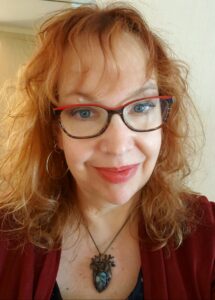Poets of the Dark: Interview with Suzanne Reynolds-Alpert
 Suzanne Reynolds-Alpert is a Technical Services Librarian who writes short fiction and poetry in the horror, scifi, and dark fantasy genres. Her short stories have appeared in the anthologies Dastardly Damsels (forthcoming), Wicked Women, The Final Summons, and Killing It Softly (Vol.1). Read her poetry in the HWA Poetry Showcase Vol. VI, the anthologies Beneath Strange Stars and Wicked Witches, and in The Wayfarer: A Journal of Contemplative Literature.
Suzanne Reynolds-Alpert is a Technical Services Librarian who writes short fiction and poetry in the horror, scifi, and dark fantasy genres. Her short stories have appeared in the anthologies Dastardly Damsels (forthcoming), Wicked Women, The Final Summons, and Killing It Softly (Vol.1). Read her poetry in the HWA Poetry Showcase Vol. VI, the anthologies Beneath Strange Stars and Wicked Witches, and in The Wayfarer: A Journal of Contemplative Literature.
She published a short collection of poetry, Interview with the Faerie (Part One) and Other Poems of Darkness and Light in 2013. When not working, Suzanne can be found reading, exploring mixed media art, and meeting the incessant demands of her feline overlords. She is a member of the HWA Social Media Team, and plans to pursue a second Master’s degree in the near future.
What sparked your interest in horror poetry? Was there a particular event or work that inspired
you to delve into the darker side of poetry?
I’ve been writing poetry most of my life, and I’ve been drawn to “dark” things most of my life, so I’ve always written dark poetry. I have found it a way to help cope with the most difficult and hard-to-define feelings and thoughts that have plagued me.
The first poem that made a huge impression on me was Poe’s The Raven. It was so deliciously alive with atmosphere and dread. In college, as an English minor, I read William Blake and other contemporaries. There was something about Blake’s work that resonated with me. I still adore the question he posed in The Tyger: What immortal hand or eye/Dare frame thy fearful symmetry?
Can you describe your creative process when writing horror poetry? Do you have any rituals or techniques that help you tap into your darkest fears and bring them to life on the page?
Many of my poems have begun with thinking of a few words that sound appealing together, or which together “paint” a picture in my mind. Then the poem grows around those seeds. Other times I’ve had a thought I want to describe or a feeling I’d like to make tangible. Poetry is such a good tool for doing that.
I don’t have any particular rituals or techniques. But creativity begets creativity, so it’s helpful to read others’ poetry, listen to music, go for a walk and take note of what I see, or make art. It is often helpful to hand-write initial poetic thoughts as well.
How do you balance the need to be evocative and disturbing with the constraints of poetic structure and form? Are there any particular strategies you use to create tension and build suspense in your horror poems?
Poets today have license to use the many existing poetic forms or create their own. I often use a form of my own creation, sometimes with mixed results.
A strategy I like to use to create tension is repetition. I used this technique in my poem, “It is Forever Stalking You” which appeared in the HWA Poetry Showcase Vol. VI. I think it worked well for that piece of work.
Who are some of your favorite horror poetry inspirations? Are there any authors or poets whose work you admire and draw inspiration from when crafting your own dark verse?
There are many fantastic poets writing dark, speculative work. Many of my favorites are in the HWA. HWA’s Poetry Showcases are amazing resources to read both established and aspiring poets. The Science Fiction Poetry Association is another place to find dark poetry.
Finally, what advice would you give to aspiring horror poets who want to explore the genre? Are there any particular challenges or pitfalls they should be aware of, and how can they overcome them to create truly terrifying poetry?
The best advice I can give is to be unafraid. Don’t be afraid to write your truth, in your own unique voice. Don’t concern yourself that your work is “too dark.” (I’m still working on this, to be honest.) I’d also advise aspiring dark poets not to turn away from a topic they’ve seen others write about. Like all good art, a poem succeeds when the person creating it writes from their own perspective, flavoring their work with their individual experiences, thoughts, and dreams (or nightmares!)



